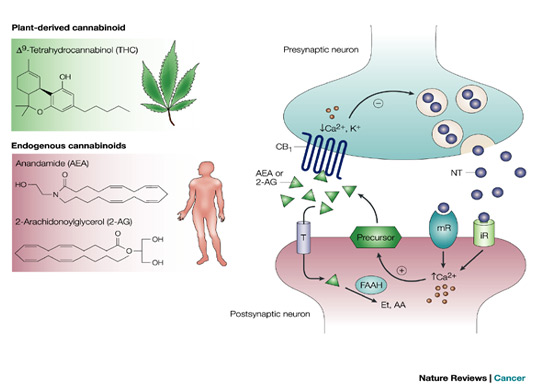摘要:一项研究表明,科研人员可能发现了让哺乳动物天生地过多食用脂肪多的食物的大脑信号的一个关键组成部分。大多数哺乳动物进化出了对富含脂肪的食物的本能选择,脂肪是营养必需品,但是在大多数自然栖息地是稀缺的。这种嗜好帮助动物在野外生存,但是这种大量食用脂肪的习惯也对工业化社会的肥胖、糖尿病和心脏病有影响,在这样的社会,人类不受限制地获得富含脂肪的食品。Daniele Piomelli及其同事进行了一项研究从而确定在肠道中产生的称为内源性大麻素的神经递质是否有帮助调控了饮食中的脂肪摄入。这组作者说,允许食用而非消化富含脂肪的食物的大鼠比食用含糖和高蛋白食物的大鼠的肠道内源性大麻素的浓度更高。这组作者报告说,口腔受体刺激了肠道的内源性大麻素的制造,后者反过来又强化了大脑中的正反馈,这可能导致过度进食。这组作者说,这些发现提示,设计用于抑制内源性大麻素在肠道的活性的药物疗法有可能减少对偏好食用富含脂肪食物的渴望,并且帮助防止可能随肥胖而来的一系列健康问题。

内源性大麻素的化学结构以及参与的信号通路
生物探索推荐英文原文:
Endocannabinoids, body's natural marijuana-like chemicals, make fatty foods difficult to resist
Recent studies have revealed potato chips and french fries to be the worst contributors to weight gain – and with good reason. Have you ever wondered why you can't eat just one chip or a single fry? It's not just the carbohydrates at fault.
UC Irvine researchers Daniele Piomelli, Nicholas DiPatrizio and colleagues found that fats in these foods make them nearly irresistible and trigger a surprising biological mechanism that likely drives our gluttonous behavior. The apparent culprit? Natural marijuana-like chemicals in the body called endocannabinoids.
In their study, the Piomelli team discovered that when rats tasted something fatty, cells in their upper gut started producing endocannabinoids. Sugars and proteins, the researchers noted, did not have this effect.
The process starts on the tongue, where fats in food generate a signal that travels first to the brain and then through a nerve bundle called the vagus to the intestines. There, the signal stimulates the production of endocannabinoids, which initiates a surge in cell signaling that prompts the wanton intake of fatty foods, Piomelli said, probably by initiating the release of digestive chemicals linked to hunger and satiety that compel us to eat more.
"This is the first demonstration that endocannabinoid signaling in the gut plays an important role in regulating fat intake," added the Louise Turner Arnold Chair in the Neurosciences and professor of pharmacology.
Study results appear this week in the online edition of Proceedings of the National Academy of Sciences.
Piomelli said that from an evolutionary standpoint, there's a compelling need for animals to consume fats, which are scarce in nature but crucial for proper cell functioning. In contemporary human society, however, fats are readily available, and the innate drive to eat fatty foods leads to obesity, diabetes and cancer.
The findings suggest it might be possible to curb this tendency by obstructing endocannabinoid activity – for example, by using drugs that "clog" cannabinoid receptors. Since these drugs wouldn't need to enter the brain, they shouldn't cause the central side effects – anxiety and depression – seen when endocannabinoid signaling is blocked in the brain, Piomelli noted.
Director of the UCI School of Medicine's Center for Drug Discovery & Development, Piomelli is one of the world's leading researchers on endocannabinoids. His groundbreaking work is showing that this system can be targeted by new treatments for anxiety, depression and obesity.
More information: "An endocannabinoid signal in the gut controls dietary fat intake," by Nicholas DiPatrizio, Giuseppe Astarita, Gary Schwartz, Xiaosong Li, and Daniele Piomelli, PNAS.







